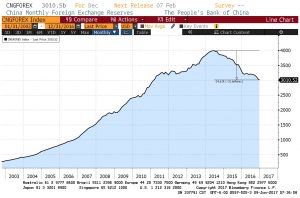Daily Comment (January 9, 2017)
by Bill O’Grady, Kaisa Stucke, and Thomas Wash
[Posted: 9:30 AM EST] It was a rather quiet weekend. We are seeing a drop in oil prices this morning attributed to reports that production in Northern Iraq, which is under Kurdish control, may be rising. It was never certain whether the Kurds would cooperate and the worry is that if one major producing nation cheats then the rest of the cartel may also defect from the agreement.
On Saturday, China released its foreign reserves data. Reserves dropped by $41 bn, near forecast.

Since peaking in June 2014, China’s foreign reserves have declined by nearly 25%, or about 10.7% annually. Although the level of reserves is still high, the drop since the peak is approaching $1.0 trillion, a massive amount. There are reports that the PBOC has been meeting with bitcoin firms in China; currently, the discussions appear to be about curbing advertising. If this is the case, it would suggest that Chinese officials, at least for now, will tolerate “insider” use of bitcoin but are interested in discouraging it from becoming a mass product. We suspect that officials realize that shutting down bitcoin would be difficult because it is most likely being utilized by CPC members for capital flight. Thus, controlling it and keeping it from the commoners makes sense.
In other news, PM May’s comments about restricting immigration sent the GBP lower this morning. Although the pound remains at historically cheap levels, worries about a “hard Brexit” continue to weigh on the currency. Reuters is reporting that leftist parties in Germany, namely, the Social Democrats (SDP), the hard-left Die Linke and the Greens, are considering a coalition. This party mix actually now controls more seats in the Bundestag and could rule. However, the SDP, which is center-left, does not agree with the pacifist Die Linke, which wants to pull out of NATO. We suspect the SDP will remain in a grand coalition with Chancellor Merkel’s CDU-CSU but is using this threat to gain more influence in the autumn elections. This suggests to us that Merkel will retain power but be a weaker leader. Finally, Ayatollah Ali Akbar Hashemi Rafsanjani died over the weekend. Rafsanjani was an influential Iranian political figure who held numerous positions since the revolution, including president. He was powerful enough to act as a counterweight to the conservative mullahs; his passing creates something of a power vacuum that will likely be filled by the conservatives.


